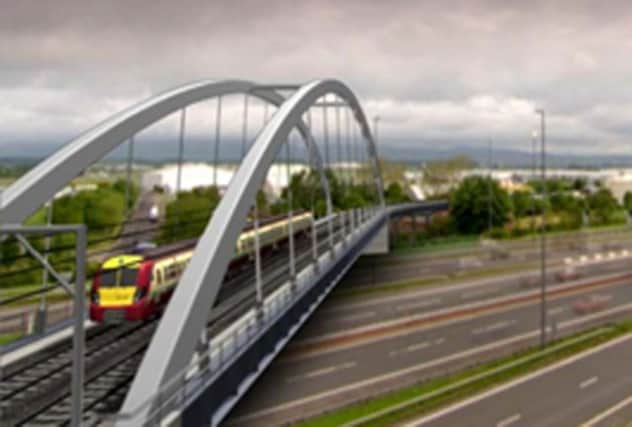Leaders: Glasgow transport links the way ahead


Prime Minister David Cameron said yesterday the money from the City Deals scheme would help pay for roads, bus services, employment programmes and an airport rail link. The UK government is to invest £500 million and the Scottish Government has agreed to match this in full.
Inevitably, with just 77 days to go to the independence referendum, the announcement will draw accusations of Westminster bribes and sweeteners. But this announcement deserves to be considered on its merits. In particular, the proposal to resurrect the Glasgow Airport Rail Link (GARL) will be welcomed by many. The decision by the minority SNP administration in 2009 to scrap it was, in retrospect, overly hasty.
Advertisement
Hide AdAdvertisement
Hide AdReviving the scheme should help meet several objectives. It will ease road congestion on the city’s southern arteries. It will help improve the west of Scotland’s transport infrastructure. And it will provide a timely economic boost in terms of new jobs and work for Scotland’s construction industry.
Investment in improved transport links plays a vital role in maintaining a thriving and competitive economy. This is the key both to business expansion and to job creation. Both the city region and Scotland as a whole need continually to refresh and improve accessibility and convenience in order both to attract inward investment from overseas and encourage expansion by domestic firms. And this is genuine capital investment, as opposed to the many items of current spending over the years to which the word “investment” was liberally applied to suggest some longer-term benefit that did not exist. The UK government has claimed the capital spend here could in time create 28,000 new jobs and could eventually generate around £1.75bn of economic growth in the city every year.
Inevitably there are competing claims on such infrastructure spending. And the Glasgow city region, together with other urban areas of the UK, has had to contend with substantial reductions in government spending as we struggle to bring down sky high debt and annual debt interest totals.
But the one certain avenue out of the politics of cuts and constraint is economic growth. Glasgow city council leader Gordon Matheson got it right when he said yesterday that the joint investment by the UK and Scottish governments and local authorities will help Glasgow and the Clyde Valley to move to the next level. “It will bring tens of thousands of jobs, encourage growth, and improve our competitiveness to bring benefits across the whole of the Clyde Valley area for the next 20 years.”
Investment on this scale should be welcomed by all parties and not be obscured by political claim and counter-claim.
High water mark for watershed
It IS 50 years ago this month that the television “watershed” was introduced. Its aim was to protect children from seeing harmful or offensive material on TV. Such programmes were not to be shown before 9pm, by which time it was deemed that most children had gone to bed.
Is this now an outdated idea, overtaken by social change and technology?
Household behaviour has changed and many young children stay up until much later. At the same time innovations such as YouTube, iPlayer, Sky+ and TV apps for smartphones have enabled viewers to shift programmes to a time of their own choosing. More than a third (37 per cent) of children aged between five and 15 with internet at home are now watching “on-demand” content. Given these changes, does the 9pm watershed have much meaning any more?
Advertisement
Hide AdAdvertisement
Hide AdThe number of viewers who think there is too much sex, violence and swearing on television has declined dramatically over the past five years. But, perhaps anomalously, support for the watershed has strengthened. In 2004, 32 per cent of people thought the watershed was too early. But almost a decade later just 11 per cent think it is too early.
According to research by the broadcast regulator, support for the watershed is the highest for 13 years, and more people think the 9pm cut-off is right than at any time since Ofcom began measuring opinions on the subject in 2000.
Digital technology may be breaching the wall, but viewers, it seems, still wish to see the wall kept in place. Attitudes may be changing, but not as fast as the onward march of the iPlayer might suggest.